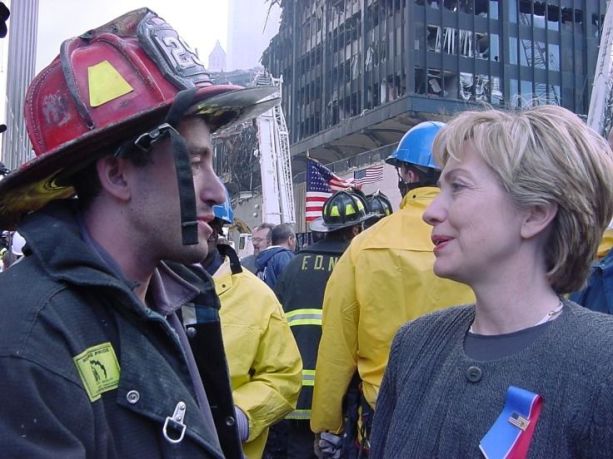Michael Weinstock said he vividly recalls seeing the smoke billowing out of the World Trade Center from downtown Brooklyn on Sept. 11.
The former Great Neck Vigilant firefighter said he grabbed a bag filled to the brim with emergency medical equipment and hitched a ride to Manhattan in an ambulance to battle the dense, black fumes.
More than two decades later, Weinstock believes his battle with those very same fumes rages on in a more personal way.
“I’m in pain every morning,” Weinstock said. “In the evening, the pain becomes intolerable.”
Weinstock told Blank Slate Media in a phone interview that he has been diognosed as suffering from a medical condition known as neuropathy.
Neuropathy is a neurological condition that damages nerves as a result of exposure to lead, individuals working with solvents and even diabetes, according to Dr. Marc Wilkenfeld, the chief of NYU Winthrop’s Division of Occupational and Environmental Medicine.
Wilkenfeld said research done by NYU and other organizations has linked neuropathy to those present at the World Trade Center on Sept. 11.
“We feel that the evidence is there, based on the studies that have been done and confirmed by other researchers as well,” Wilkenfeld said. “So it seems like there’s a body of literature that confirms that exposure to the World Trade Center toxins increases your risk of developing neuropathy.”
While those suffering from neuropathy, including Weinstock, can turn to physical therapy and drugs such as Lyrica and Gabapentin for pain relief, there is no known cure for it.
“The nerves have been damaged, you can’t fix the nerves,” Wilkenfeld said. “So people have this terrible pain, numbness and weakness, so it really is symptomatic treatment. There’s no way to cure it, unfortunately.”
Aside from the physical pain Weinstock said he suffers each day, his financial situation has taken a turn for the worse.
He said he is about to be evicted from his Great Neck residence because of medical bills accrued to combat the illness.
“The pain is oftentimes manageable and within the first few years people can bring it down and I’m doing my best to make that happen,” Weinstock said. “Unfortunately, it becomes tougher to manage when I’m receiving an eviction notice.”
The World Trade Center Health program, which provides first responders at ground zero with health care for certain conditions, does not include neuropathy in its coverage.
Weinstock, a lawyer who ran in the Democratic primary for the 3rd Congressional District in 2020, received assistance from embattled U.S. Rep. George Santos, the district’s current representative.
Santos, Weinstock said, invited him to the State of the Union address in February where he made his case to have neuropathy included in the World Trade Center Health program, which to date is still not.
Coincidentally, Santos had lied about his mother’s alleged “experience” during the Sept. 11 attacks, which was later unearthed by the New York Times.
Weinstock said he did not vote for Santos in the 2022 election in which he defeated Democrat Robert Zimmerman, but expressed his gratitude for Santos’ desire to aid him in his quest to have neuropathy included as a covered condition.
The former congressional candidate said he received several calls from Santos inquiring about his mental and physical state after a 2021 injury that resulted in the realization of his condition.
“He told me most friendships in politics are transactional, but that he would be devastated if anything happened to you,” Weinstock said of Santos’ calls to him.
“‘Promise me that if you’re ever feeling suicidal that you will call me before anything’, he told me.”
Weinstock spoke on the high suicide rate from the condition due to the ongoing pain individuals endure on a daily basis and the lack of a true cure for it.
While photographic evidence shows Weinstock at ground zero, even shaking hands with former Presidential candidate and Secretary of State Hillary Clinton, disputes about his involvement on Sept. 11 have become another battle for Weinstock.
Philip Katz, an attorney and the president of Great Neck Vigilant Fire Company, said Weinstock was not present at ground zero as a member of the Vigilant Fire Company.
Weinstock had filed a lawsuit against Katz and Vigilant’s Benevolent Association for defamation, but said he had to suspend the lawsuit due to his health.
Speaking of Weinstock’s condition, Katz told Blank Slate Media in an email, “I wish him well. This being said, I hope that someone in the media will ask him for proof that he truly suffers from the condition he claims to be afflicted with at some point.”
Weinstock, a member of Vigilant from 1990-20021, said, “Katz felt emboldened to damage my reputation because I am an openly gay man and he doesn’t want the firehouse to be associated with an openly gay person.”
Dr. Bryan Weissman, a former Vigilant firefighter and chairman of the Vigilant board, said in a statement that “The claim that Michael was not at ground zero is unacceptable and the photographs reflect the truth.”
Former Vigilant Chief Andy DeMartin, in a statement, said “I think it’s just bad business for the fire company, the organization should be above the fray. He was there. You can’t just erase somebody being there.”
Despite being in the eye of the storm from the physical and financial situation, Weinstock described himself as “blessed” because of his network of friends and his experience as a litigator. Not everyone in his situation can feel the same way, he said.
More than $8,000 has been raised on a GoFundMe for Weinstock.
The former firefighter thanked everyone who has donated for their support and urged others to learn more about his condition by visiting: https://www.gofundme.com/f/help-a-911-firefighter-walk-again.

